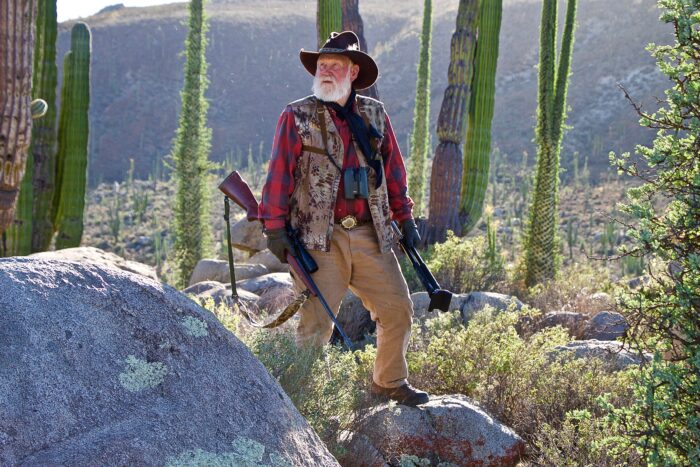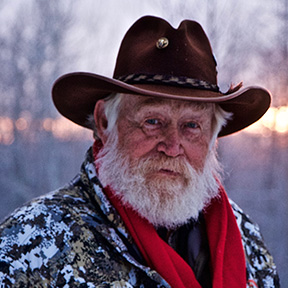The Aging Outdoorsman
Recently, while scanning some “social media,” which I only do very occasionally, I found a photo of an older hunter with a really nice whitetail buck. The caption read, “Granddad, even at 69, is still getting it done!” That statement made it sound like he had escaped from his deathbed or the “Old Folks Home” to make one last hunt.
“Hhhmmmm! Buffalo chips!” Should you wish to quote me regarding that or anything close to that statement.
I started hunting farther back than memory allows me to recall while I was still in diapers. Then, I personally didn’t start hunting sheep until after my 65th birthday, nor the mountains of Europe for ibex. Surpassing the age of three score and ten I have continued hunting the mountains in North America and Europe. These days having passed the age of 75 I am still hunting, hunting a lot, many days each year in all sorts of terrain and habitats.
Yes, I have had to make some concessions compared to when I was in my 30s, but I certainly have not quit hunting, even at over twice that age.
One of the many things I have learned, having hunted for something over 70 years, is that when younger, hunting the “high country” or even “the low country,” I walked and hunted too fast. Glassing a distant ridge or slope, “I knew.” I was looking at the best hunting grounds, and I knew that was where I should be. I took off nearly at a trot to get there, seldom looking left, right, or behind. Once there, I would glass the area from which I had come and realize I had left the best hunting.
These days, as an “older, nay mature hunter,” I spend considerably more time glassing, looking, moving slowly, stopping occasionally, looking in all directions, including behind me. As a result, I am seeing considerably more game and other wildlife. And I am also taking extremely good animals. Not that, as a youngster, I did not take my share of the game, including mature animals. But, on the whole, these days, as a more observant hunter than I was during my “youth,” the bucks I am taking are bigger than in the past for the areas I am hunting. The old adage, “Hunt smarter!” comes to mind.
With advancing age, I have become a more patient hunter, willing to sit and watch rather than continually be on the move and, when moving, do so slower. Deer and other game and non-game animals immediately notice quick movements than slow, almost orchestrated movements.
Deer and other wildlife tend to walk a little way then stop to smell, watch and, listen, and feed rather than walk at a steady pace. My way of walking these days replicates the way “critters” walk. This often allows me to approach and get closer to wildlife while hunting.
I am fortunate and blessed in many ways, including friends, among those are fellow DSC members Jim Zumbo, J. Wayne Fears, Luke Clayton, Dr. Richard Allen, Bryan Booth and others who have 70 years in their rearview mirror. They indeed still are hunting and fishing and doing it with great relish and success, I might add. Are they still hunting the “high country”? Occasionally! But they are doing so slowly, knowing their limitations.
Thanks to Mossberg, I am going on a moose hunt in British Columbia, Canada, with Love Brothers & Lee this fall. It has been a few years since I last hunted moose. My first step after getting the invitation was to contact Ron Fleming with Love Brothers & Lee to tell him I was past 75 years of age, still in reasonably good health, but also someone who, in his younger years, had been in 13 helicopter crashes as well as several horse and mule wrecks.
I wanted Ron to know I might not be running and jumping up and down mountains as I once did. I explained there were some days when my back and knees had different plans than mine. I wanted him to know upfront what he and his guides might be dealing with before our hunt rather than getting to camp and then springing some things on them. With that knowledge that I might have some physical limitations, he could say, “Don’t come because the hunt will be really tough and too tough and strenuous for you!” or he could plan accordingly. Interestingly, he responded that he, too, was beyond 70 and totally understood. He explained how they hunted moose during the last days of the rut, when bulls were on the prowl looking for “un-settled cows”. The way they hunt is primarily by cruising lake shorelines in a boat, stopping occasionally to call and sit and glass. He said I should not have any problems during the hunt.
If I was excited about the moose hunt before I corresponded with Ron, after doing so, I was ecstatic. I knew and know I can hunt how he described we will be doing. That he also added that he had some solid young packers care for the moose after I shot one. Having packed out several moose in years past, that latter made me smile!
In preparation for that and other hunts this fall, I walk whenever possible. My wife and I try to walk a minimum of a mile most mornings, although I admit there are some mornings I would just as soon stay at my desk and write. Having just gotten back to walking with some regularity, I will continue doing so. I will soon start carrying my backpack, to which I will add ten pounds. After a while, I will increase the weight to 20 pounds. Then, after I have again gotten leg, back, and shoulder muscles “up to speed”, I’ll likely increase this to 40 pounds. Over the years, I have tried many different “things and ways” to get in shape for hunting. Walking and carrying a backpack has worked better for me than anything else I have tried.
All this said, I have never been or considered myself a “hunting athlete,” as a select few like to think of themselves. Interestingly, over the years, I have walked a few of those, as the old saying goes, “into the dirt,” even at twice their age. I no longer try to do such things because, as I mentioned, walking fast when hunting may get one to the destination quicker, but, in the process, there is no telling what that “hunter” walked past and never saw. To me, walking fast is not really hunting but merely a “country stroll.”
One of the biggest things about growing older is realizing one’s current limitations. Of course, that is good advice when one is in one’s twenties to eighties. If you are going on a guided hunt or simply striking out on your own, know and remember your limitations, then abide by only what you are capable of doing.
Hunting is supposed to be fun! If you are struggling or truly hurting on a hunt, you are not having fun or a good time. Nor are you being observant of all things going on around you and being a good hunter. Always be honest with yourself and those you hunt with or plan to hunt with about your physical capabilities and inabilities. But, just because you can no longer walk ten miles without stopping, scale a perpendicular cliff, or jump over a ten-foot stream or a mountain does not mean it is time to quit hunting. Far from it!
Slow down, sit, and occasionally move at your own pace. Hunt smarter. Doing so will make you a better and more successful hunter. Again, this is proper advice whether you are in your twenties or your eighties! There is no retirement from being a hunter! Age is not a limitation!
Professional wildlife biologist/outdoor communicator, Larry Weishuhn, known to many as “Mr. Whitetail”, has established quality wildlife management programs on over 12,000,000 acres throughout North American and other parts of the world. He has hunted big game with rifle and/or handgun on six continents. Larry is a Professional Member of the Boone & Crockett Club, life-member of numerous wildlife conservation organizations including the Dallas Safari Club, Mule Deer Foundation, and Wild Sheep Foundation. He currently serves on the DSC Foundation Board of Directors, is one of three co-founders of the Texas Wildlife Association; is a member of the Legends of the Outdoors Hall of Fame and the Muy Grande Hall of Fame; he too, received the Zeiss Lifetime Achievement Award among many other honors.


